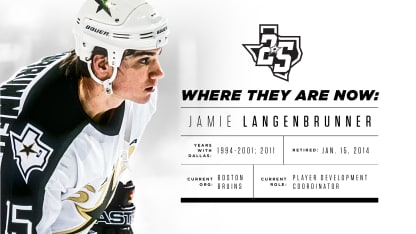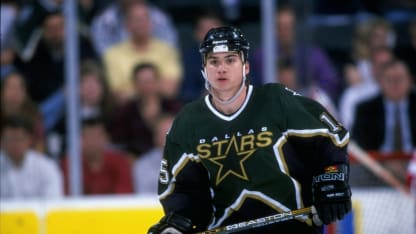Funny how these things happen, how the most innocuous of moments can shine a light on a path that changes everything, a path that brings light to darkness and offers up something of a second chance.
And so it was, two summers ago, Jamie Langenbrunner was vacationing with former teammates, Jay Pandolfo and Zach Parise and their respective spouses in the Napa area of California.
Pandolfo suggested to Langenbrunner that there might be an opening with the Boston Bruins in their player development department. Did Langenbrunner think he might be interested?
Retired since injuries brought to a close a noble NHL career that spanned 1,109 regular season games and two Stanley Cup wins, including one in Dallas in 1999, Langenbrunner thought it over and said, sure, he'd give it a whirl.
Where they are now: Jamie Langenbrunner
The 1999 Cup champion with the Stars is relishing his post-playing career in player development

\[LISTEN: Burnside Chats podcast featuring Sportsnet.ca's Elliotte Friedman, Jamie Benn and Ken Hitchcock\]
The first season was a kind of trial for both the Bruins and the native of Cloquet, Minnesota as Langenbrunner worked with Pandolfo to get the hang of what goes into player development. Then Pandolfo moved to the Bruins' coaching staff as an associate coach and the job was Langenbrunner's full-time.
Always cerebral, Langenbrunner embraced the challenge of something new -- something that was different than he'd expected.
"As a player you think you have a pretty good idea of what's going on," Langenbrunner said.
Um. Maybe not.
"This has been about learning something completely different," the 42-year-old said. "It's been a big eye-opener for me."
The bulk of his career was spent with two teams -- Dallas which had selected him 35th overall in 1993, and New Jersey to whom he was traded in 2002 -- and Langenbrunner has enjoyed learning a new job with a new organization, and an "Original Six" one to boot.
"There is something different about them which I've come to realize coming to work for them now," he said. "It's a different following and it's a different mentality a little bit."
There's nothing like being a player, and a player who has achieved at the highest level. And on the other side of the ledger, there is nothing like finding out that being a player isn't in the cards anymore.
Langenbrunner won a second Stanley Cup with the Devils, in 2003 and then, nearing the end of his career, he returned to Dallas briefly in 2011 before signing a one-year deal with St. Louis. He signed a second one-year deal in the summer of 2012, but when the lockout ended a torn labrum that required surgery limited Langenbrunner to four games that season.
He never played again, and officially retired two years after the hip surgery.
"Partly, it was decided for me," Langenbrunner said of the end. "If there would have been a contract there to go play, I would have gone and played again."
He could have gone somewhere on a tryout basis, but with young kids and the uncertainty that would have brought with it, Langenbrunner wasn't prepared to do that.
"It was difficult," Langenbrunner said. "It was a tough adjustment."
A father of three -- two boys and a girl -- helping to coach and attend children's events was gratifying. Of course it was.
"But that doesn't quite fill everything," Langenbrunner said.
As the fall gave way to the winter, and heart of the hockey season, Langenbrunner found it difficult to fill the void in those early years of retirement.
"I'll say it was a darker time in my life for a year or two," he said. "It was very difficult."
Few players were as respected as Langenbrunner.
Few players delivered in the clutch like Langenbrunner.
We recall being slightly surprised when Ron Wilson, head coach of the U.S. Olympic team in 2010, and Team USA GM Brian Burke, named Langenbrunner captain -- ahead of players with perhaps higher profiles like Jack Johnson, David Backes, Ryan Kesler, Ryan Suter or Parise.
But Langenbrunner was in almost every way the perfect choice to captain a team that came achingly close to Olympic gold, losing to Canada in overtime in the gold medal game.
He delivered for Team USA, for Dallas and with the Devils, playing 1,109 regular season games and collecting 663 points. But it was in the playoffs where he was at his best, producing 87 points in 146 postseason games.
He admitted that, for a time, he looked at his career not necessarily with satisfaction, but with the kind of longing that comes from being a perfectionist.
"Part of what drove me as a player was that it wasn't good enough for me," Langenbrunner said.
He asked hard questions of himself both as a player and after his retirement.
"What did I miss out on? How could I have been better?" he recalled.
Had he taken better care of himself would things have been different? Would there have been a way to win a third Cup?
As time has passed, though, Langenbrunner has come to grips with accepting his limitations -- such as they were -- as a player, and it's helped put his career and his retirement in perspective. And with that perspective has come a kind of being at peace.

It's also helped him understand what confronts young players coming through the Boston system and allowed him to enjoy success in his second career.
"I feel very fortunate now that I'm part of it," Langenbrunner said.
Although both Parise and Langenbrunner are from Minnesota, it wasn't until Parise's rookie season in New Jersey in 2005-06 that the two met personally. It was a meeting that made a lasting impression on Parise and helped establish a lifelong bond.
"He was really good to me being a young guy by myself," Parise recalled.
Whether it was dinners at the Langenbrunner home to help break up the monotony of living in a team-designated hotel in the first months of Parise's NHL career, or Langenbrunner's veteran presence on the bench, they were moments that were invaluable for Parise, who would later become captain of the Devils and continues to be a strong veteran presence in Minnesota.
For a time, Parise and another young forward, Travis Zajac, played on a line with Langenbrunner.
"He was a good, calming presence for me in the locker room," said Parise, who admits to being a player who sometimes gets worked up on the bench during games.
Langenbrunner would sometimes look over and say, "Relax, we're fine," Parise recalled with a laugh.
"He competed. He was a great he played hard and he played the right way," the Minnesota Wild forward said.
Parise doesn't recall the specifics of that summer discussion that led to Langenbrunner's new role, but understands how difficult it can be to make the transition from player to something else.
"I would imagine just like everyone once that's done you're trying to fill time," he said. "It's kind of all we know for a long period of time."
Parise joked that when the families met this summer in Nantucket, there was a lot more Bruins talk than usual. But that's okay.
"To me, it seemed like a good fit," Parise said. "He's a really intelligent guy. He understands the game and understands players."
And maybe that's part of it -- Langenbrunner's own journey of self-discovery, which makes this new phase of his post-playing life so exciting.
It certainly has revived Langenbrunner's love for the game.
"I am actually enjoying hockey more than when I was playing at the end," Langenbrunner said. "I've enjoyed being around the game."
Langenbrunner has had a bird's-eye view of the Bruins organization from top to bottom, thanks to GM Don Sweeney, who came out of the player development end of things after retiring from playing.
"He's been awesome allowing me to be a part of the whole, big picture," Langenbrunner said.
Assistant GM John Ferguson Jr. has been welcoming explaining much of the business side of the game, from lease agreements at the minor-pro level to rules governing contracts and the like.
"It's like going to hockey school as far as kind of the business side of running a team," Langenbrunner said.
At the heart of what Langenbrunner is doing is connecting with the Bruins' young prospects.
Like anything, it's a skill that Langenbrunner had to cultivate and work on. Entering his third season with the Bruins, and second as the head of player development, there's a comfort level that's been achieved.
"You have an idea in your head -- something you want to give them advice on, and it's building that relationship," he said.
Having kids who are in the same age bracket (Langenbrunner has a 19-year-old daughter, and teenage boys ages 17 and 15) has helped.
"Having a kid call you about something that's not hockey related, that's when I feel like I'm doing my job well," he said.
\[RELATED: Langenbrunner to return March 23 vs. Boston as part of Reunion Nights at American Airlines Center\]
"I just want to be an extension of the coaches as far as the hockey stuff," Langenbrunner added. "I don't want to get in the way."
Pandolfo saw how quickly Langenbrunner took to the work, immersing himself in it -- even the more tedious parts like meetings.
"Sometimes, those meetings can be long and you're there all day," Pandolfo said with a laugh. "But I remember him saying right away, 'I love this stuff.'"
"I think he started feeling it right away -- 'Hey, I have a voice here, and it matters,' and I think that's important when you're part of an organization that you're not going through the motions, you're making an impact. And Jamie certainly is," he added.
This story was not subject to approval of the National Hockey League or Dallas Stars Hockey Club. You can follow Scott Burnside on Twitter @OvertimeScottB and listen to his Burnside Chats podcast here.


















